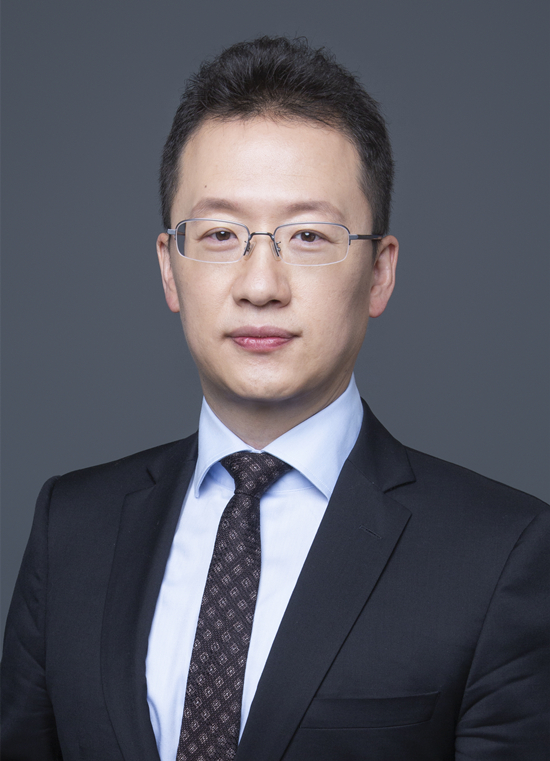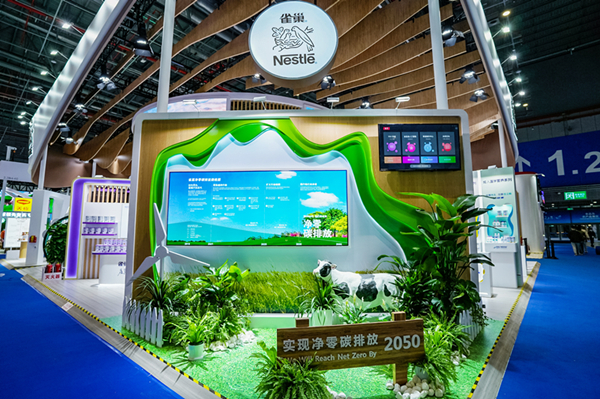Nestlé top executive: Sustainable development should be implemented every day
- By Zhang Rui
 0 Comment(s)
0 Comment(s) Print
Print E-mail China.org.cn, November 10, 2022
E-mail China.org.cn, November 10, 2022
A top executive of food giant Nestlé told China.org.cn that they are sparing no effort in pursuing sustainable development in China, which is critical for the country and the world.

Sustainable development has featured as a highlight at Nestlé's booth during the fifth China International Import Expo (CIIE). Followed by Nestlé's net zero roadmap released in 2020, the company carried out important initiatives and projects in regenerative agriculture, sustainable packaging, and other fields. Recently, Nestlé China joined hands with Syngenta Group China to promote the development of regenerative agriculture, as well as launched the Nescafé Plan 2030 to work with coffee farmers to support and promote the transition to regenerative agriculture. These projects aim to help consumers not only "eat well and eat healthily" while also to contribute to building a greener Earth and a more beautiful China.
"For Nestlé, sustainable development is not a slogan or a simple goal, but something that should be implemented every day with practical actions from the inside out, and an important 'license' to determine whether our enterprise can survive in the future," said David Fang, vice president of Corporate Affairs & Sustainability, Nestlé Zone Greater China. "As one of the world's leading food and beverage enterprises, we see deeper problems. If the current trend of extreme weathers where global warming is not effectively curbed, the food safety system of all humanity may encounter rather serious problems. In the past decade, the output of the top 10 coffee bean-producing areas in the world has basically been declining, and the quality of coffee beans has also been affected, which shows that our planet has reached a very critical crossroads, and we need to make a choice."
According to Nestlé's roadmap, it will achieve net zero greenhouse gas emissions across its value chain by 2050. It also has more specific phased goals: "We will reduce carbon emissions by 20% in 2025 and 50% in 2030. The clock is ticking, and I feel the great pressure as we continue to walk down the path to shorten the distance from where we are to where we want to be. It's a great test for the company."
In Zone Greater China, Nestlé's sustainable development focuses on three areas, Fang elaborated. "First, it is carbon reduction, reducing the carbon footprint of the whole production process. The top priority is agriculture, with 70% of the emission reductions in our value chain coming from upstream agricultural products. Second, we will transform to sustainable packaging, which is pretty challenging, especially in the food industry. According to incomplete statistics, in 2020 China's food industry uses more than 75% of PET plastic from China's entire plastic industry. If the industry cannot make revolutionary changes in packaging, plastic will pollute so many environments where humans live. Third is sustainable sourcing. In Zone Greater China, we achieved the goal of 100% sustainable sourcing of coffee beans four years in advance than planned."
Fang stressed that for sustainable development to succeed in China, "[Nestlé] must abide by local market needs and laws and regulations to make products and measures that best meet the needs of the Chinese market. In terms of carbon reduction, we will focus on agriculture. In 2020, we have built a grain capacity center based on the modern farms in Harbin in order to improve farmers' ability to farm through our expertise in this field. This year, we have adhered to the innovative concept of regenerative agriculture through systems that improve soil fertility, farmers' working methods, and manure treatment, among others. Through these, we can improve the cultivation of grains and restore soil fertility. This is not something that Nestlé can do alone. We must cooperate with other leading enterprises."
He revealed that he recently signed a MoU on behalf of Nestlé with Bayer Crop Science (China) Co., Ltd. on strategic cooperation in low-carbon rice planting in northeast China, aiming to jointly explore and implement sustainable agricultural practices to ensure carbon reduction and neutralization throughout the food value chain. "Through such strong cooperation, we hope that in 2025 or 2030, with the demonstration effect brought by our experimental fields, more farmers will join in our low-carbon environmental protection actions."
The executive said he's proud of the company's success in cultivating Pu'er coffee, as well as the cultivation of generations of coffee farmers. In Pu'er, southwest China's Yunnan province, Nestlé will continue to push to new heights in the maintenance of biodiversity and in coffee farming by planting shade trees and growing better coffee beans.

Nestlé participates in the CIIE every year. Fang said the company sees the expo as a good platform and stage to showcase Nestlé's most innovative, forward-looking, and sustainable development methods. "Every year, we integrate all the resources of the group via multi-channels and multi-business units. This year, more than 300 products from 16 countries are displayed at CIIE, 90 of which made their debut in China."
Fang said CIIE is also a very good platform for Nestlé to demonstrate its confidence in China's future investment and development environment as well as its determination to pursue long-term development in the second-largest market in the world for the company. "As we all know, in the past two or three years, especially after the outbreak of the COVID-19 pandemic, many enterprises were faced with difficulties of one kind or another. Despite all that, since the pandemic, our new investment has exceeded 1.4 billion yuan. By participating in the expo, we want to give greater confidence to our partners, government leaders, and our own employees, which shows that we are optimistic about the potential and future development of China's economy."





